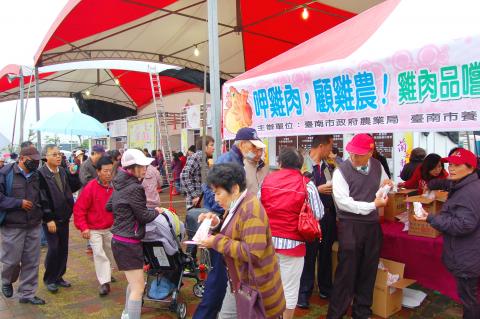A WHO official said on Thursday that there have been no confirmed cases of H5N2 avian influenza affecting humans and the possibility of the virus seriously affecting human health in a way similar to the more virulent H5N1 was low.
Gregory Hartl, spokesperson for the WHO’s Global Alert and Response Network, told the Central News Agency that H5N2 is one of many avian flu viruses and that it is unpredictable, but so far there have been no confirmed cases of humans contracting the H5N2 virus.
It is possible that there might be incidents of the H5N2 virus existing undetected in humans and the virus might affect humans in the future, but the present risk to humans was low, he said.

Photo: Wang Han-ping, Taipei Times
The official made the remarks after Taipei alerted the World Organization for Animal Health on March 3 that a highly pathogenic H5N2 strain had been detected and resulted in a recent outbreak.
According to Department of Health Deputy Minister Lin Tzou-yien (林奏延), blood samples from nine workers at a poultry farm in Changhua County were tested, but the H5N2 virus was not detected.
In Greater Tainan, where about 4,000 chickens were culled last month after the H5N2 virus found at a farm was confirmed to be highly pathogenic, 38 workers have had blood samples taken, Lin said, adding that the test results had not come back yet.
He said H5N2 is a commonly found virus among birds and the “highly pathogenic” tag refers to the high infection rate among birds affected by the virus, not its possible effect on humans.
He added that no global medical data showed that H5N2 had infected humans.
He called for Taiwanese not to panic over the latest H5N2 outbreak, suggesting that chicken and eggs be fully cooked before being consumed.

Taiwan yesterday condemned the recent increase in Chinese coast guard-escorted fishing vessels operating illegally in waters around the Pratas Islands (Dongsha Islands, 東沙群島) in the South China Sea. Unusually large groupings of Chinese fishing vessels began to appear around the islands on Feb. 15, when at least six motherships and 29 smaller boats were sighted, the Coast Guard Administration (CGA) said in a news release. While CGA vessels were dispatched to expel the Chinese boats, Chinese coast guard ships trespassed into Taiwan’s restricted waters and unsuccessfully attempted to interfere, the CGA said. Due to the provocation, the CGA initiated an operation to increase

CHANGING LANDSCAPE: Many of the part-time programs for educators were no longer needed, as many teachers obtain a graduate degree before joining the workforce, experts said Taiwanese universities this year canceled 86 programs, Ministry of Education data showed, with educators attributing the closures to the nation’s low birthrate as well as shifting trends. Fifty-three of the shuttered programs were part-time postgraduate degree programs, about 62 percent of the total, the most in the past five years, the data showed. National Taiwan Normal University (NTNU) discontinued the most part-time master’s programs, at 16: chemistry, life science, earth science, physics, fine arts, music, special education, health promotion and health education, educational psychology and counseling, education, design, Chinese as a second language, library and information sciences, mechatronics engineering, history, physical education

The Chinese military has boosted its capability to fight at a high tempo using the element of surprise and new technology, the Ministry of National Defense said in the Quadrennial Defense Review (QDR) published on Monday last week. The ministry highlighted Chinese People’s Liberation Army (PLA) developments showing significant changes in Beijing’s strategy for war on Taiwan. The PLA has made significant headway in building capabilities for all-weather, multi-domain intelligence, surveillance, operational control and a joint air-sea blockade against Taiwan’s lines of communication, it said. The PLA has also improved its capabilities in direct amphibious assault operations aimed at seizing strategically important beaches,

‘MALIGN PURPOSE’: Governments around the world conduct espionage operations, but China’s is different, as its ultimate goal is annexation, a think tank head said Taiwan is facing a growing existential threat from its own people spying for China, experts said, as the government seeks to toughen measures to stop Beijing’s infiltration efforts and deter Taiwanese turncoats. While Beijing and Taipei have been spying on each other for years, experts said that espionage posed a bigger threat to Taiwan due to the risk of a Chinese attack. Taiwan’s intelligence agency said China used “diverse channels and tactics” to infiltrate the nation’s military, government agencies and pro-China organizations. The main targets were retired and active members of the military, persuaded by money, blackmail or pro-China ideology to steal